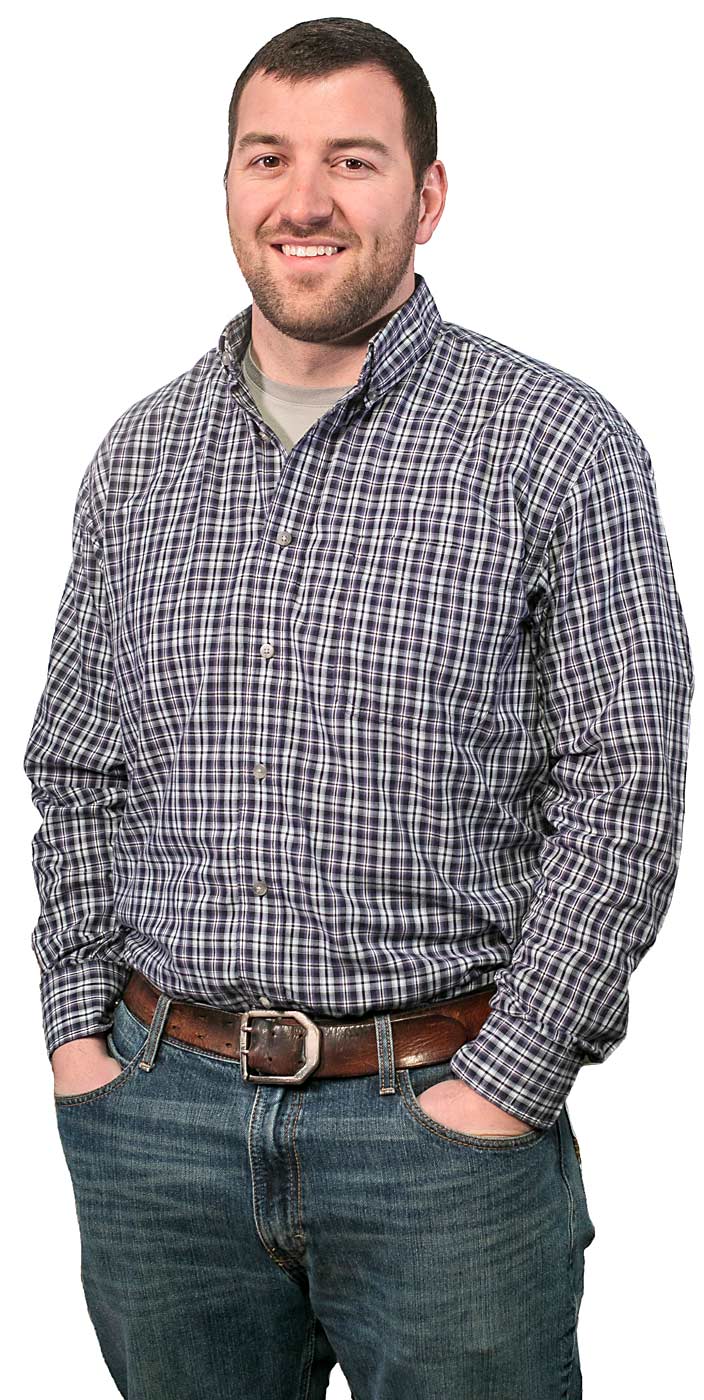family background/Kevin is a fourth-generation grower who grew up in the Wenatchee River Valley. He graduated from Washington State University with a degree in fruit and vegetable management, is the son of Kim and Dan Kenoyer and is married to Kiera Kenoyer.
age/26
grower/Cashmere, Washington
crops/Cherries, apples, pears
business/Wilbur-Ellis and Kenoyer Orchards
 How did you get your start?
How did you get your start?
I remember during middle school and high school, I started with swamping cherries and helping out with preharvest, to weed spraying, mowing and odd jobs. During the summers before I graduated from college, I worked for Wilbur-Ellis on an internship where I’d ride with fieldmen to different orchards checking traps for codling moth.
It helped me gain experience about the job and also see what it’d be like if I worked as a full-time employee. Those fieldmen eventually became longtime mentors.
After I graduated and joined Wilbur-Ellis, I was able to save up enough money to purchase a small family orchard that came up for sale.
What challenges do you have in this area?
In this area, we have challenges that other farms don’t necessarily have to deal with. One of them is farming on steep hillsides where the snow hangs longer into the spring.
Some of the early season sprays are hard to get on those trees because of the snow. I’ve talked with field representatives from other areas and they’ll say, “Hey, you’ve got to get that part of the spray program going,” but we’ve got challenges here that force us to take a different approach.
At my personal farm, I’ve got hillsides that require a skilled tractor driver to be able to maneuver during parts of the year. I can’t hire just anybody to operate the tractors and hope that it’ll just go OK.
What benefits come with owning your own farm?
The farm that I purchased was an established cherry orchard, so I didn’t need to go through the planting phase.
It also came with the equipment to run the orchard. It’s not the newest, nicest or shiniest stuff, but I get to learn how to work on all of the tools to make the farm work.
One of my learning lessons has been figuring out how to make the tractors and sprayers work better. Now, when something breaks down, I’ll be able to work on it on my own.
I’m also excited about trying to increase production, changing some of the pruning styles and using some newer technology that I’ve seen at other farms to make it more profitable.
Any tips for first-time farm buyers?
If I was looking to buy into an orchard and get started, I’d first set up a meeting with the USDA Farm Service Agency. They have some programs to help young farmers.
I’d also be saving every little last bit that you can to help make ends meet when financing the farm. It’ll pay off in the end. When looking for opportunities, try to select blocks with good varieties then work hard once it’s in your hands.
Would you advise buying an existing farm to start with?
That depends on your financing. If you’re purchasing land in our area and want to put in an orchard, some of the high-density plantings can cost $50,000 an acre.
If you can get into an orchard that’s already established and make it work for a while, then maybe you’ll be able to upgrade after a few years of making some money.
Why did you choose to work as a field representative?
One of the main reasons why I chose to become a fieldman was to get involved with different people’s operations and not just be stuck on only one farm.
I get to see 20 to 30 farms and see how people are doing things differently and offer advice where I can. That aspect is really rewarding to me.
The best part of the year is when we get to harvest, and I can go around and look at different growers’ fruit and see how things we implement in the field change the final outcome. I enjoy it when I can help a grower end up with good fruit.
What kind of trends do you see in your area?
I’d say one of the trends I’m seeing is farms putting in soil moisture monitoring equipment. Those tools will help everyone manage how much water they’re putting in the soil and how it’s moving down through the profile, as opposed to just kicking the dirt or using a shovel to check.
We can get actual data where we can make accurate decisions instead of just guessing. I’ve also seen some growers move toward different types of spray programs that are softer.
There’s also a focus on what beneficial insects can do. They are weaving softer spray programs together with beneficial insects to maximize pest control — using all of the new tools available to us as growers.
What would you tell young growers about farming?
When starting out, take a look at the industry as a whole and find an area that you have a passion for. Whether it be in technology, mechanization or any aspect of the horticultural parts of the farm, just go for it.
Farming isn’t just manual labor any more. I think there’s several job opportunities in ag that aren’t well known to the general public.
– TJ Mullinax






Leave A Comment